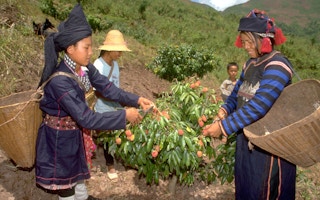Smallholder farmers are the key to food security, natural resource stewardship and the end to poverty, according to the United Nations in a newly-released report.
Commissioned by the United Nations Environment Programme-World Conservation Monitoring Centre (UNEP-WCMC) and the International Fund for Agricultural Development (IFAD) and released in line with the celebration of World Environment Day on Wednesday, Smallholders, Food Security and the Environment details the crucial role smallholder farmers play in the global scale.
Smallholder farmers are farmers with small farms, operating roughly two hectares of land for agriculture. In Asia, there is a high percentage of small farms, for example, 98 per cent in China, based on information by the Corporate Leadership Coalition for Smallholder Farmer Livelihoods, a private sector group managed by international non-profit consulting firm FSG.
These farmers, said the report, manage approximately 500 million small farms and produce more than 80 per cent of the food eaten in most parts of the developing world, specifically those in Southern Asia and sub-Saharan Africa.
According to one study, a one per cent increase in agricultural per-capita Gross Domestic Product (GDP) reduced the poverty gap five times more than an equal increase in another sector of the GDP.
Nevertheless, majority of these smallholders only have pre-commercial operations or farms with low yield and low profitability, and are unable to reinvest in their farms. The farmers also have limited skills and know-how, limited links to market and are more vulnerable to climate change and natural resource challenges.
But empower them and give them support, these small-time farmers can change food production, creating a sustainable agricultural revolution that the world needs, the report indicated.
“Smallholder farmers can continue to be marginalised or be recognised as catalysts for a transformation of the way the world manages the supply of food and the environmental services that underpin agriculture in the first place,” said Achim Steiner, UN under-secretary-general and UNEP executive director.
“Two decades of underinvestment in agriculture, growing competition for land and water, rising fuel and fertiliser prices, and climate change have left smallholders less able to escape poverty,” he explained.
Also, according to the report, the very resource base that smallholder farmers depend on has taken its toll.
The previous agricultural green revolution in the 1960s and 1970s may have dramatically spurred productivity in farms, as well as reduced poverty, but the practices of those times have led to the current degraded state of lands and other natural resources. Habitats have been modified or forests cleared, soil has less nutrients, crop diseases have emerged, water has been overused and both water and soil have been polluted.
Still, the paper stated that land and other resources are pressured to feed a growing and more-urbanised world population.
UNEP-WCMC and IFAD have included recommendations in their report. Switching from a vicious cycle to a virtuous cycle, the report calls for a scaling up a sustainability landscape approach or a sustainable agricultural intensification, which maintains smallholders’ resources while enhancing production and rural development.
It also pushes for the removal of policy barriers to sustainable agricultural growth and in turn providing incentives. For example, taking away subsidies on unsustainable fertilisers and subsidising means that allow for soil and water conservation.
Steiner noted: “This report makes it clear that investing in this sector offers the highest rate of return for those interested in overcoming poverty and realising and building upon the Millennium Development Goals, including MDG-7 on environmental sustainability.”
“Following the Rio+20 Summit and as part of the post-2015 sustainable development agenda, including developing a set of Sustainable Development Goals, there is a growing and powerful focus on sustainable food systems. This includes the UN Secretary-General’s Zero Hunger Challenge and UNEP and the Food and Agricultural Organization’s “Think. Eat. Save. Reduce Your Foodprint” campaign.”

















